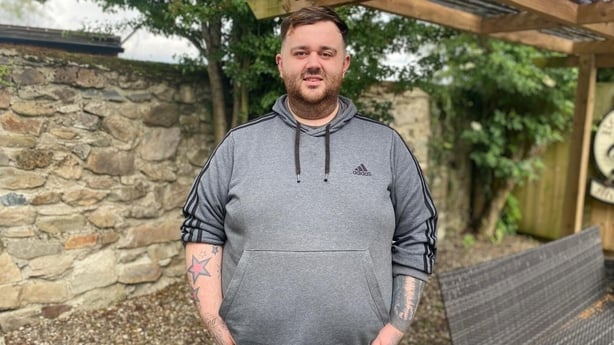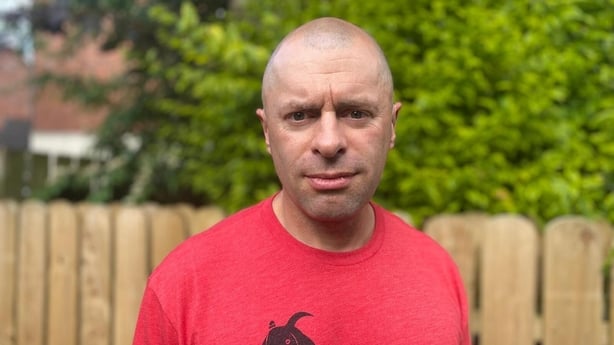A leading housing expert has called for the establishment of a commission in Northern Ireland to examine housing policy and how the region can avoid the mistakes of the crisis in the south.
The North is experiencing a housing shortage, resulting in rapidly growing social housing waiting lists and rising rents. In 2023, house building hit a 60-year low.
Paddy Gray, Professor of Housing at Ulster University, sits on the Housing Commission - a body set up by the Irish Government to examine housing policy in the south. He thinks the North is in danger of tipping into a full-blown housing crisis.
"I think we need some sort of taskforce or commission to look holistically at housing in Northern Ireland and look at the experiences that have happened down here [in the south], and try and mitigate against those things happening in the North," he said.
We need your consent to load this rte-player contentWe use rte-player to manage extra content that can set cookies on your device and collect data about your activity. Please review their details and accept them to load the content.Manage Preferences
Mr Gray said the North is not yet experiencing the same affordability issues as the south.
"Certainly if I lived in Galway or Dublin, I would be saying I'll move up North because it's a lot cheaper, and I could probably commute. But people don’t work like that.
"But it depends on the local areas. People are saying in Derry the housing is unaffordable. And it is for a lot of people, because it’s scarce and prices are rising, but not to the same extent as down here. But then again, wages aren’t the same, incomes are a lot lower [in the North]."
Just as in the south, demand for housing in the North is outstripping supply.
Around 47,000 households are on the waiting list for social housing - nearly double the figure it was 20 years ago.
Laura, a mother of four in Belfast, said she had been on the list for nine years.
"As a mother, your job is to protect and provide for your kids.

"Telling my kids that we’re moving constantly, it’s mentally affecting big time."
While Laura has been on the list, the government’s housing body has placed the family in a range of temporary accommodation. Sometimes it is a hostel, sometimes an own-door property.
"It leaves you feeling on edge, and you have anxiety and depression," she said.
Laura added that she struggles with feeling the situation is her fault, as her children do not understand and ask her why she cannot buy them a home.
Demand for housing is not just concentrated around Belfast.
More: Our Lives In The North
Alex Burke, a support worker with Slate, a youth homelessness project in Omagh in Co Tyrone, said there are only a handful of rental properties currently available in the town and he is not aware of any social housing imminently becoming available.
"Sofa-surfing is probably one of the biggest things we’ve seen with young people.
"Hidden homelessness is one of the biggest things in Omagh. A lot of people don’t realise how big it is in rural areas.
"In Belfast, you’d see a lot more people on the street, whereas down here you don’t, even in Enniskillen you wouldn’t see anybody on the street. It’s more hidden. And it’s not spoken about enough."

At the heart of the issue is the fact there are simply not enough homes.
There are several factors that help to explain why supply has not been keeping up with demand.
The fallout from the financial crash in 2008 limited capacity for building houses.
But even before the crash, not enough social homes were being built. The government’s public housing body, the NI Housing Executive (NIHE), has not been allowed to build houses for more than 25 years.
Instead, the NIHE commissions groups called Housing Associations to build homes. They are not public bodies and are allowed to borrow more money.
Grainia Long, chief executive of the NIHE, said the inability for them to build is a fundamental reason why housing need has grown to high levels.
"When my organisation was set up, it built many thousands of homes per year. At one point we were building 9,000 homes per year."
Ms Long said taking such a major player out of the social housing market left a huge gap and not enough new builds are going into the system.
There are plans to allow the NIHE to start building again. But as that change still hasn’t come into effect, the NIHE continues to commission Housing Associations to build.
Ms Long said the projected need for social homes is 5,000 per year over the next five years. However, she said it is almost impossible for that need to be met.

"This year our budget has been dramatically reduced. At the moment, I have a budget to commission 600 homes. Now that will be the lowest number in many years, and we are extremely concerned.
"That will materially impact the waiting list. There will, without question, be hundreds of households on that list for longer because we are not building social housing at the scale we should be.
"You take your eye off the new build social housing ball at your peril, because once you turn off that tap it’s very, very difficult to turn it back on."
Another factor holding back building houses in the North is inadequate wastewater infrastructure. NI Water has said that of the 37,000 properties waiting to be connected to the sewage network, 19,000 of the development applications cannot go ahead.
NI Water said the sewage system is at capacity due to "historical underinvestment". The water system in the North is mostly funded by government resources, rather than charging people directly. Water charges exist in other parts of the UK, but so far politicians in Northern Ireland have been resistant to introducing them.
In addition to too few social houses being built, the existing stock has contracted over time.
In 1979, Margaret Thatcher’s Conservative government introduced a policy that meant social tenants could buy their home at a discounted rate. It was a popular scheme, and in Northern Ireland more than 100,000 homes were taken out of the social housing sector in this way.
Due to the shortage of social housing, more people are ending up in temporary accommodation, and staying there for longer. If the NI Housing Executive assesses someone as having the greatest housing need, it has a legal duty to provide that person with accommodation unless and until secure social housing becomes available.
Ms Long said the demand for temporary accommodation has been growing consistently, but accelerated during the pandemic. She said in the space of 18 months, the number of placements grew from 3,000 per year to 10,000.
Ms Long attributes this to a number of factors. Firstly, during the pandemic people in informal arrangements like sofa-surfing had to move out.
Second, after the pandemic, due to the economic impact many people lost their private rental tenancies.
She said the third reason is an increase in the number of people arriving in the North.
In Northern Ireland, temporary accommodation usually means hostels run by voluntary sector organisations, with private ensuite rooms and on-site supports. Sometimes it means an own-door property.
But increasingly, it means hotels and B&Bs. The NIHE expenditure on using these locations for temporary accommodation has increased significantly. In 2019/20, the figure was £1.9 million. So far in 2023/24 the figure is £12.2 million.
Those on the social housing waiting list who are not assessed as needing temporary accommodation may have to rely on the North’s expanding private rental sector, where average rent has increased by around 10% in the past year.
The North’s rental sector is not as regulated as it is in the Republic of Ireland. Until recently, tenants were only entitled to a notice-to-quit period of four weeks.
Earlier this year, Andrew Larmour’s family received such a notice. Andrew, his wife, their two children and his mother-in-law had been living in a rented home in south Belfast since 2017.
Mr Larmour calls it "blind luck" that they managed to find another place to rent in the area, but the rent is 62% more than their previous property. Mr Larmour works as a civil servant and said three quarters of his take-home monthly pay is now going towards the family’s rent.

Mr Larmour said the family has been on the social housing waiting list since 2011, and it is unlikely they will ever be able to afford to buy a home. He describes feeling "trapped" in the private rental sector.
"It honestly makes you feel like a failure, you can’t provide. And even getting two levels of promotion won’t make the slightest bit of difference.
When he thinks about the future, he says it is "very concerning".
"Whenever we reach retirement age, we obviously won’t be homeowners. It’s very concerning because you’re not able to put something towards something, that at the end of the day is yours.
"At the end of the day, you’re putting it into the landlord’s back pocket and in the end they can kick you out for whatever reason."
Our Lives in the North is a new six-part podcast series from RTÉ Radio 1, available on the RTÉ radio app or wherever you get your podcasts.
Listen: Episode 1 Health; Episode 2 Education; Episode 3 Paramilitaries







